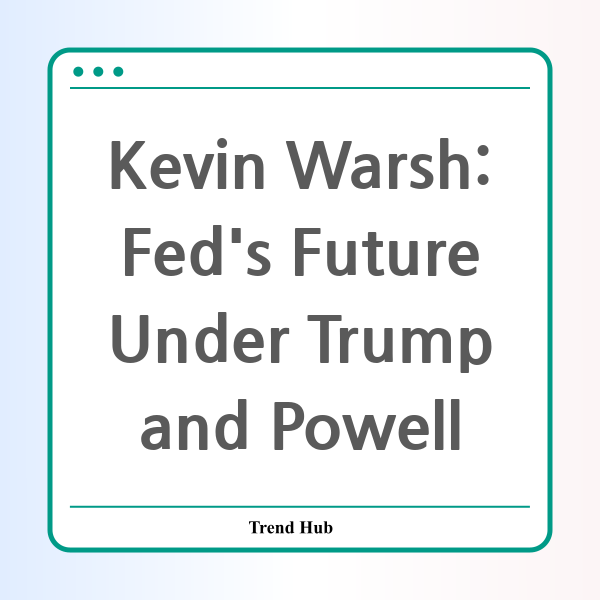* This website participates in the Amazon Affiliate Program and earns from qualifying purchases.

Kevin Warsh: The Fed's Future Under Trump and Powell
What happens when a former president and a Federal Reserve chair come to loggerheads? This conflict has become increasingly relevant as Donald Trump has publicly bashed Jerome Powell, the current Fed Chairman. Trump's recent demands for Powell's termination have raised eyebrows across the financial world, leading many to wonder about the potential candidates, including Kevin Warsh, who could take the reins of the Federal Reserve.
Since his first appointment in 2018 by Trump, Powell has faced scrutiny over interest rate decisions, especially with the backdrop of ongoing economic challenges. Trump’s outbursts on social media and during Oval Office meetings reflect a deep-seated dissatisfaction with the way Powell is guiding monetary policy. As Trump stated, "Jerome Powell of the Fed, who is always TOO LATE AND WRONG… Powell's termination cannot come fast enough!" This direct attack on the Fed Chairman indicates a turbulent relationship that has been brewing since Powell took the helm.
But who is Kevin Warsh, and why is he being considered as a viable alternative to Powell? Warsh, who served as a Fed governor from 2006 to 2011, is a seasoned financial expert with insights into the Federal Reserve’s complex operations. His policies during his tenure reflected a cautious approach to regulatory measures and an acute awareness of market dynamics. Warsh has publicly criticized Powell’s approach, often arguing for a more proactive stance in managing interest rates, especially amid rising inflationary pressures.
One of the reasons for Trump's renewed criticism of Powell is the central bank's handling of interest rates in light of escalating trade wars and tariffs that Trump implemented during his presidency. The Fed’s independent stance faces unprecedented challenges, particularly as it navigates the murky waters of political influence and market stability. Powell's recent remarks regarding tariffs being larger than expected hint at the pressures the Fed faces, putting them in what he described as "uncharted waters."
The landscape for the Federal Reserve is shifting, and so is the public's perception of its leaders. Trump’s influence puts additional strain on Federal Reserve autonomy, prompting speculation about potential candidates like Warsh stepping into a leadership position. Warsh has a unique perspective rooted in his time at the Fed, having a firsthand understanding of the responsibilities and challenges that come with the role. Moreover, if appointed, he may bring with him a more aggressive interest rate strategy, potentially reflecting Trump’s demands for economic stimulation.
However, the implications of appointing Kevin Warsh extend beyond mere monetary policy adjustments. The impact on financial markets, consumer confidence, and inflation control are paramount considerations. Should Trump proceed to push for Powell's ousting, the conversations around Warsh’s candidacy will intensify, raising critical questions about the lasting influences of political sentiment on economic governance.
As this narrative unfolds, the focus remains on the Federal Reserve’s ability to operate independently while maintaining stability in the U.S. economy. With ongoing debates about the Fed's role in economic recovery and inflation management, the appointment of its leadership will undeniably shape the future of economic policy.
In conclusion, the dynamics between Trump, Powell, and potential successors like Kevin Warsh illustrate the complexities of monetary policy in an increasingly politicized environment. As we await further developments, one thing is clear: the decisions made at the helm of the Federal Reserve will resonate through every corner of the economy.
* This website participates in the Amazon Affiliate Program and earns from qualifying purchases.